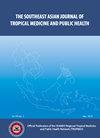阑尾切除术阴性率-当前前瞻性-综述
IF 0.1
4区 医学
Q4 INFECTIOUS DISEASES
Southeast Asian Journal of Tropical Medicine and Public Health
Pub Date : 2023-07-15
DOI:10.9734/ajmah/2023/v21i10873
引用次数: 0
摘要
在诊断急性阑尾炎时,一般采用阴性的阑尾切除率,以防止穿孔等并发症的发生。这一比率因世界西部和东部地区的国家而异。临床评分系统,炎症标志物和影像学已被用于降低阑尾切除术阴性率。计算机断层扫描的引入提高了急性阑尾炎的诊断准确性。由于这一比率在过去几年中逐渐下降,我们做了一篇综述文章来研究评分系统、炎症标志物和影像学在诊断急性阑尾炎中的作用,从而降低阑尾切除术阴性率。本文章由计算机程序翻译,如有差异,请以英文原文为准。
Negative Appendectomy Rates -Current Prospective- A Review
The negative appendectomy rate is generally accepted in the diagnosis of acute appendicitis to prevent complications like perforation. This rate varies according to countries in western and eastern regions of the world. Clinical scoring systems, inflammatory markers and imaging have been used to reduce the negative appendectomy rate. The introduction of computerized tomography has improved the diagnostic accuracy of acute appendicitis. As this rate has been progressively decreasing over the past few years, a review article was done to look at the role of scoring systems, inflammatory markers, and imaging in diagnosing acute appendicitis and hence reduce the negative appendectomy rate.
求助全文
通过发布文献求助,成功后即可免费获取论文全文。
去求助
来源期刊

Southeast Asian Journal of Tropical Medicine and Public Health
PUBLIC, ENVIRONMENTAL & OCCUPATIONAL HEALTH-INFECTIOUS DISEASES
CiteScore
0.40
自引率
0.00%
发文量
0
审稿时长
3-8 weeks
期刊介绍:
The SEAMEO* Regional Tropical Medicine and Public Health Project was established in 1967 to help improve the health and standard of living of the peoples of Southeast Asia by pooling manpower resources of the participating SEAMEO member countries in a cooperative endeavor to develop and upgrade the research and training capabilities of the existing facilities in these countries. By promoting effective regional cooperation among the participating national centers, it is hoped to minimize waste in duplication of programs and activities. In 1992 the Project was renamed the SEAMEO Regional Tropical Medicine and Public Health Network.
 求助内容:
求助内容: 应助结果提醒方式:
应助结果提醒方式:


